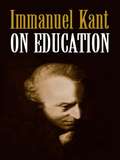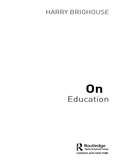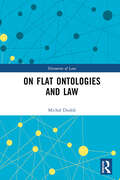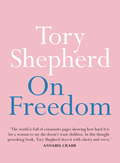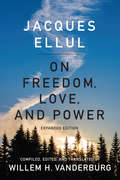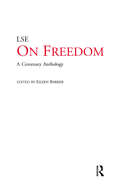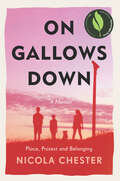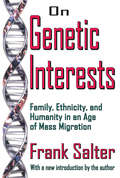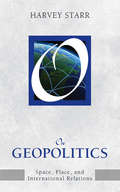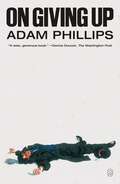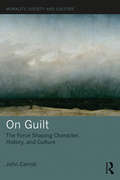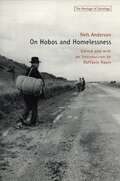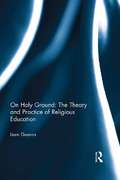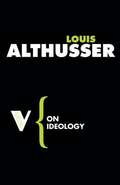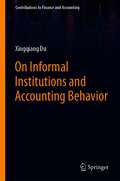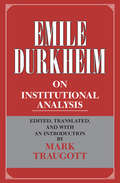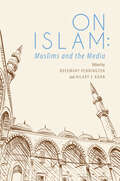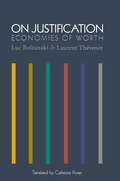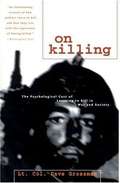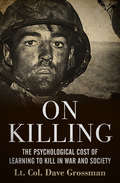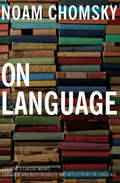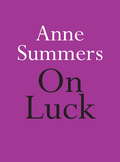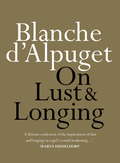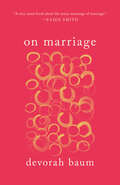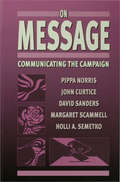- Table View
- List View
On Education
by Immanuel Kant"One of the greatest problems of education," Kant observes, "is how to unite submission to the necessary restraint with the child's capability of exercising his free will." He explores potential solutions to this dilemma, stressing the necessity of treating children as children and not as miniature adults. His positive outlook on the effects of education include a conviction that human nature could be continually improved; to achieve this end, he advocated that pedagogy, the science of education, be raised to academic status and studied at a university level -- an innovative notion for the 18th century.
On Education (Thinking in Action)
by Harry BrighouseWhat is education for? Should it produce workers or educate future citizens? Is there a place for faith schools - and should patriotism be taught? In this compelling and controversial book, Harry Brighouse takes on all these urgent questions and more. He argues that children share four fundamental interests: the ability to make their own judgements about what values to adopt; acquiring the skills that will enable them to become economically self-sufficient as adults; being exposed to a range of activities and experiences that will enable them to flourish in their personal lives; and developing a sense of justice. He criticises sharply those who place the interests of the economy before those of children, and assesses the arguments for and against the controversial issues of faith schools and the teaching of patriotism. Clearly argued but provocative, On Education draws on recent examples from Britain and North America as well as famous thinkers on education such as Aristotle and John Locke. It is essential reading for anyone interested in the present state of education and its future.
On Flat Ontologies and Law (ISSN)
by Michał DudekThis book examines the importance of flat ontologies for law and sociolegal theory. Associated with the emergence of new materialism in the humanities and social sciences, the elaboration of flat ontologies challenges the binarism that has maintained the separation of culture from nature, and the human from the nonhuman. Although most work in legal theory and sociolegal studies continues to adopt a non-flat, anthropocentric and immaterial take on law, the critique of this perspective is becoming more and more influential. Engaging the increasing legal interest in flat ontologies, this book offers an account of the main theoretical perspectives, and their importance for law. Covering the work of the five major theorists in the area – Gabriel Tarde, Bruno Latour, Manuel DeLanda, Karen Barad and Graham Harman – the book aims to encourage this interest, as well as to explicate the important problems of and differences between these perspectives. Flat ontologies, the book demonstrates, can offer a valuable new perspective for understanding and thinking about law.This book will appeal mainly to scholars and students in legal theory and sociolegal studies; as well as others with interests in the posthumanist turn in philosophy and social theory.
On Freedom
by Tory ShepherdThey're labelled as selfish, as 'deliberately barren', and sometimes as crazy old cat ladies, but increasingly women are choosing to be childfree. Over the next few decades couples without children are set to outnumber those who have them. Tory Shepherd looks at how women's freedom to choose motherhood is reshaping their own lives as well as society.
On Freedom, Love, and Power
by Jacques Ellul Willem H. VanderburgOne of the most important and original thinkers of the twentieth century, Jacques Ellul (1912-1994) was a noted sociologist, historian, law professor, and self-described "Christian anarchist." At the University of Bordeaux, Ellul taught and wrote extensively on the relationship between technology and contemporary culture, the tenets of the Christian faith, and the principles of human freedom and responsibility. On Freedom, Love, and Power is the transcription of a series of talks given by Ellul in 1974 in which he refines and clarifies some of his most controversial insights on the Jewish and Christian Bibles and their relevance to contemporary society.This expanded edition of Ellul's talks features additional material, previously unavailable, that focuses on Christianity's potential service to humanity as a community that exemplifies a society where people are reconciled with one another and with God.
On Freedom: A Centenary Anthology
by Eileen BarkerThe London School of Economics and Political Science has embraced the full range of the social sciences and its related disciplines. Contributors to this book were invited to write on the subject of freedom.
On Gallows Down: Place, Protest and Belonging
by Nicola ChesterPart nature writing, part memoir, On Gallows Down is an essential, unforgettable read for fans of Helen Macdonald, Terry Tempest Williams, and Robin Wall Kimmerer. Nicola Chester won the BBC Wildlife Magazine’s Nature Writer of the Year Award – this is her first book. On Gallows Down is a powerful, personal story shaped by a landscape; one that ripples and undulates with protest, change, hope – and the search for home. From the girl catching the eye of the “peace women” of Greenham Common to the young woman protesting the loss of ancient and beloved trees, and as a mother raising a family in a farm cottage in the shadow of grand, country estates, this is the story of how Nicola Chester came to write – as a means of protest. The story of how she discovered the rich seam of resistance that runs through her village of Newbury and its people – from the English Civil War to the Swing Riots and the battle against the Newbury Bypass. And the story of the hope she finds in the rewilding of Greenham Common after the military left, the stories told by the landscapes of Watership Down, the gallows perched high on Inkpen Beacon and Highclere Castle (the setting of Downtown Abbey). Nature is indelibly linked to belonging for Nicola. She charts her story through the walks she takes with her children across the chalk hills of the North Wessex Downs, though the song of the nightingale and the red kites, fieldfares, skylarks and lapwings that accompany her; the badger cubs she watches at night; the velvety mole she discovers in her garden and the cuckoo, whose return she awaits. On Gallows Down tells of how Nicola came to realize that it is she who can decide where she belongs, for home is a place in nature and imagination, which must be protected through words and actions. "We are writing for our very lives and for those wild lives we share this one, lonely planet with."—Nicola Chester
On Genetic Interests: Family, Ethnicity and Humanity in an Age of Mass Migration
by Frank SalterFrom an evolutionary perspective, individuals have a vi- tal interest in the reproduction of their genes. Yet this interest is overlooked by social and political theory at a time when we need to steer an adaptive course through the unnatural modern world of uneven population growth and decline, global mobility, and loss of family and communal ties. In modern Darwinian theory, bearing children is only one way to reproduce. Since we share genes with our families, ethnic groups, and the species as a whole, ethnocentrism and humanism can be adaptive. They can also be hazardous when taken to extremes. On Genetic Interests canvasses strategies and ethics for conserving our genetic interests in an environmentally sustainable manner sensitive to the interests of others.
On Geopolitics: Space, Place, and International Relations
by Harvey StarrOn Geopolitics shows how the 'new geopolitics' combines the fields of geography and international relations to create a comprehensive overview of current political developments. Using recent developments in geographical technology as well as traditional theories and methods, Harvey Starr explores themes of spatiality and territoriality as they connect to international affairs. He also examines geopolitical dynamics beyond borders in a world now buffeted by non state actors and subject to intergovernmental institutions and norms. On Geopolitics is a brilliant synthesis of Starr's ongoing work on conflict and co-operation, alliances, opportunity, and willingness, within a geographic framework. At the same time, Starr points the way toward new tools and techniques for the study of globalisation and world politics.
On Giving Up
by Adam PhillipsOne of The New York Times Critics' Picks of the YearFrom acclaimed psychoanalyst Adam Phillips, a meditation on what we must give up to feel more alive.To give up or not to give up?The question can feel inescapable but the answer is never simple.Giving up our supposed vices is one thing; giving up on life itself is quite another. One form of self-sacrifice feels positive, something to admire and aspire to, while the other is profoundly unsettling, if not actively undesirable.There are always, it turns out, both good and bad sacrifices, but it is not always clear beforehand which is which. We give something up because we believe we can no longer go on as we are. In this sense, giving up is a critical moment—an attempt to make a different future.In On Giving Up, the acclaimed psychoanalyst Adam Phillips illuminates both the gaps and the connections between the many ways of giving up and helps us to address the central question: What must we give up in order to feel more alive?
On Guilt: The Force Shaping Character, History, and Culture (Morality, Society and Culture)
by John CarrollGuilt is the dark force behind haunting anxiety, obsessive-compulsive behaviour, life meaninglessness, and depression – a force to be kept in check. Yet guilt is equally our richest and most hidden resource, the essence of our humanness, and it drives us on to our highest achievements. Today, when individuals feel bad it is not usually because of something specific they have done. Rather, thundering around in the depths of their being is guilt: obscure, unconscious, yet irrepressible and ever-present. Where does it come from, what are its ways, and how might it be put to useful work? This book explores the nature of guilt, shedding light on how the modern West came increasingly to understand it as ‘the most terrible sickness’. It traces the psychological origins of guilt in each person’s family, and demonstrates the historical rise of guilt in parallel with civilization. It examines the modern predicament: the difficulty of finding explanations for guilt in a secular, post-church society – and the possibility of relief from its curse, while channelling it into a fulfilling life. As such it will appeal to those with interests in sociology, psychology, psychiatry, cultural studies, cultural history, and anthropology.
On Hobos And Homelessness (Heritage Of Sociology Series)
by Nels Anderson Raffaele RautyNels Anderson was a pioneer in the study of the homeless. In the early 1920s Anderson combined his own experience "on the bummery," with his keen sociological insight to give voice to a largely ignored underclass. He remains an extraordinary and underrated figure in the history of American sociology.
On Holy Ground: The Theory And Practice Of Religious Education
by Liam GearonReligion has had notable and renewed prominence in contemporary public and political life. Religious questions have also been freshly examined in philosophy and theology, the natural sciences, the social sciences, psychology, phenomenology, politics and the arts. These fields reflect complex, multi-disciplinary understandings of religion, some hostile, some accommodating. For religious education this has all contributed to its own international renaissance. Religious education, in ensuring it is contemporary, shares with these fields the same criticality, the same distance between the study of religion and the religious life. Yet what are the grounds of this modern religious education? Through a systematic historical and contemporary cross-disciplinary analysis, answering this question is the ambitious task of the book. Chapters include: philosophy, theology and religious education the natural sciences and religious education the social sciences and religious education psychology, spirituality and religious education phenomenology and religious education the politics of religious education the aesthetics of religious education. The central problem of all modern religious education remains this: what are the grounds of religious education when religious education is no longer grounded in the religious life, in the life of the holy? Although this primarily appears to be an epistemological problem, it soon becomes a moral and existential one. The book will be of key interest to teachers, theorists and researchers working in religious education.
On Ideology
by Louis Althusser Ben BrewsterThis major voice in French philosophy presents a classic study of how particular political and cultural ideas come to dominate society. Spanning the years 1964 to 1973, On Ideology contains the seminal text, "Ideology and Ideological State Apparatus" (1970), which revolutionized the concept of subject formation. In "Reply to John Lewis" (1972-73), Althusser addressed the criticisms of the English Marxist toward On Marx and Reading Capital. Also included are "Freud and Lacan" (1964) and "A Letter on Art in Reply to Andr#65533; Daspre" (1966).
On Informal Institutions and Accounting Behavior (Contributions to Finance and Accounting)
by Xingqiang DuThis book focuses on the Chinese context to investigate how informal institutions (Confucian culture and its dimensions, religion, political connections) in China affect accounting behaviors. This book tries to show that cultural influence and religious impacts in China are not trivial and increasingly important, and specifically, informal institutions have its bright and dark sides with regard to its effects on accounting behaviors. This book aims to investigate whether and how informal institutions (Confucian culture and its dimensions, religion, political connections) affect micro-level accounting behaviors, including but not limited to audit quality, financial misstatement, R&D, corporate misconducts, corporate philanthropy and corporate environmental responsibility. This book provides graduate students, scholars and practitioners in the fields of accounting, business administration and religion with an in-depth understanding about how informal institutions as a set of social norms affect micro-level accounting behaviors. First, this book is the first to focus on the Chinese context and investigate the effects of informal institutions on accounting behavior. Second, this book documents systematic evidence to show the bright and dark sides with regard to the relation between informal institutions and accounting behavior in China. Lastly, this book reveals informal institutions can serve as an important mechanism to affect accounting behaviors.
On Institutional Analysis (Heritage Of Sociology Ser.)
by Emile DurkheimRanging from Durkheim's original lecture in sociology to an excerpt from the work incomplete at his death, these selections illuminate his multiple approaches to the crucial concept of social solidarity and the study of institutions as diverse as the law, morality, and the family. Durkheim's focus on social solidarity convinced him that sociology must investigate the way that individual behavior itself is the product of social forces. As these writings make clear, Durkheim pursued his powerful model of sociology through many fields, eventually synthesizing both materialist and idealist viewpoints into his functionalist model of society.
On Islam: Muslims and the Media
by Hilary E. Kahn Rosemary PenningtonIn the constant deluge of media coverage on Islam, Muslims are often portrayed as terrorists, refugees, radicals, or victims, depictions that erode human responses of concern, connection, or even a willingness to learn about Muslims. On Islam helps break this cycle with information and strategies to understand and report the modern Muslim experience. Journalists, activists, bloggers, and scholars offer insights into how Muslims are represented in the media today and offer tips for those covering Islam in the future. Interviews provide personal and often moving firsthand accounts of people confronting the challenges of modern life while maintaining their Muslim faith, and brief overviews provide a crash course on Muslim beliefs and practices. A concise and frank discussion of the Muslim experience, On Islam provides facts and perspective at a time when truth in journalism is more vital than ever.
On Justification: Economies of Worth (Princeton Studies in Cultural Sociology)
by Luc Boltanski Laurent ThévenotA vital and underappreciated dimension of social interaction is the way individuals justify their actions to others, instinctively drawing on their experience to appeal to principles they hope will command respect. Individuals, however, often misread situations, and many disagreements can be explained by people appealing, knowingly and unknowingly, to different principles. On Justification is the first English translation of Luc Boltanski and Laurent Thévenot's ambitious theoretical examination of these phenomena, a book that has already had a huge impact on French sociology and is likely to have a similar influence in the English-speaking world. In this foundational work of post-Bourdieu sociology, the authors examine a wide range of situations where people justify their actions. The authors argue that justifications fall into six main logics exemplified by six authors: civic (Rousseau), market (Adam Smith), industrial (Saint-Simon), domestic (Bossuet), inspiration (Augustine), and fame (Hobbes). The authors show how these justifications conflict, as people compete to legitimize their views of a situation.On Justification is likely to spark important debates across the social sciences.
On Killing: The Psychological Cost of Learning to Kill in War and Society
by Dave GrossmanThe twentieth century, with its bloody world wars, revolutions, and genocides accounting for hundreds of millions dead, would seem to prove that human beings are incredibly vicious predators and that killing is as natural as eating. But Lieutenant Colonel Dave Grossman, a psychologist and U. S. Army Ranger, demonstrates this is not the case. The good news, according to Grossman - drawing on dozens of interviews, first-person reports, and historic studies of combat, ranging from Frederick the Great's battles in the eighteenth century through Vietnam - is that the vast majority of soldiers are loath to kill. In World War II, for instance, only 15 to 25 percent of combat infantry were willing to fire their rifles. The provocative news is that modern armies, using Pavlovian and operant conditioning, have learned how to overcome this reluctance. In Korea about 50 percent of combat infantry were willing to shoot, and in Vietnam the figure rose to over 90 percent. The bad news is that by conditioning soldiers to overcome their instinctive loathing of killing, we have drastically increased post-combat stress - witness the devastated psychological state of our Vietnam vets as compared with those from earlier wars. And the truly terrible news is that contemporary civilian society, particularly the media, replicates the army's conditioning techniques and - according to Grossman's controversial thesis - is responsible for our rising rates of murder and violence, particularly among the young. In the explosive last section of the book, he argues that high-body-count movies, television violence (both news and entertainment), and interactive point-and-shoot video games are dangerously similar to thetraining programs that dehumanize the enemy, desensitize soldiers to the psychological ramifications of killing, and make pulling the trigger an automatic response.
On Killing: The Psychological Cost of Learning to Kill in War and Society
by Lt. Col. Dave GrossmanA controversial psychological examination of how soldiers&’ willingness to kill has been encouraged and exploited to the detriment of contemporary civilian society. Psychologist and US Army Ranger Dave Grossman writes that the vast majority of soldiers are loath to pull the trigger in battle. Unfortunately, modern armies, using Pavlovian and operant conditioning, have developed sophisticated ways of overcoming this instinctive aversion. The mental cost for members of the military, as witnessed by the increase in post-traumatic stress, is devastating. The sociological cost for the rest of us is even worse: Contemporary civilian society, particularly the media, replicates the army&’s conditioning techniques and, Grossman argues, is responsible for the rising rate of murder and violence, especially among the young. Drawing from interviews, personal accounts, and academic studies, On Killing is an important look at the techniques the military uses to overcome the powerful reluctance to kill, of how killing affects the soldier, and of the societal implications of escalating violence.
On Language: Chomsky's Classic Works: Language and Responsibility and Reflections on Language
by Noam ChomskyThe two most popular titles by the noted linguist and critic in one volume—an ideal introduction to his work. On Language features some of Noam Chomsky&’s most informal and highly accessible work. In Part I, Language and Responsibility, Chomsky presents a fascinating self-portrait of his political, moral, and linguistic thinking. In Part II, Reflections on Language, Chomsky explores the more general implications of the study of language and offers incisive analyses of the controversies among psychologists, philosophers, and linguists over fundamental questions of language. &“Language and Responsibility is a well-organized, clearly written and comprehensive introduction to Chomsky&’s thought.&” —The New York Times Book Review &“Language and Responsibility brings together in one readable volume Chomsky&’s positions on issues ranging from politics and philosophy of science to recent advances in linguistic theory. . . . The clarity of presentation at times approaches that of Bertrand Russell in his political and more popular philosophical essays.&” —Contemporary Psychology &“Reflections on Language is profoundly satisfying and impressive. It is the clearest and most developed account of the case of universal grammar and of the relations between his theory of language and the innate faculties of mind responsible for language acquisition and use.&” —Patrick Flanagan
On Luck
by Anne Summers'Australians' fervent belief in luck is deeply etched in our consciousness. More than with the citizens of other countries, it affects the way we see most things. When someone escapes serious injury or death in an accident, we remark on how lucky they were. We don't say they were unlucky to have had the accident in the first place.'In ON LUCK, Anne Summers explores the gambling culture that is so intrinsic to being Australian, corruption in business, the economy, our obsession with being 'The Lucky Country', and which Australian city is the best example of a place that has relied on its luck and lost.
On Lust & Longing
by Blanche d'AlpugetOn Lust & Longing brings two of Blanche D'Alpuget's prominent works together. When On Lust was first published it caused a media sensation: d'Alpuget wrote of a pillar of society who had molested children and of events that ended in mystery. She revealed all. On Longing caused a similar sensation, for different reasons. D'Alpuget dared to write that she loved and had inspired love in a man already adored by the public. Here are the raw and timeless themes of the power and powerlessness inherent to lust, love, loss and death.
On Marriage
by Devorah BaumA compulsively readable, startling, and philosophically rich book about marriage, from an acclaimed critic and filmmaker&“Baum is an erudite and entertaining guide through the landscape of marriage. . . . A fascinating exploration.&”—Stephanie Merritt, The Guardian &“As far back as our history books go, we have no record of a time preceding marriage. Isn&’t that an extraordinary fact?&” So writes Devorah Baum in this searching and revelatory book. Marriage, for better or for worse, is how humans have organized their world and told their story. Straight, queer, coupled, single: none live outside the remit of marriage. One might as well try to live beyond language. But when confronted with the question &“What do intellectuals think of marriage?&” Baum concludes that most philosophers have preferred to avoid the subject. Is marriage then an intellectual blind spot? To fill in the gaps, she draws on a wide range of cultural material, from the classical to the contemporary, while interweaving reflections on her own experiences of matrimony to both critique and celebrate marriage&’s many contradictions and its profound effects on us all. In doing so, she reveals how marriage has worked as a cover story for power and its abuses on the one hand, and for subversive and even utopian relational practices on the other. Entertaining, illuminating, consoling, and candid, On Marriage is an unprecedented investigation of what we are really talking about when we talk about marriage.
On Message: Communicating the Campaign (Political Science Ser.)
by Pippa Norris David Sanders Margaret Scammell Holli A Semetko John CurticeTo what extent are the techniques of campaigning and media management critical to the outcome of modern elections? This book brings together a group of leading scholars to provide a comprehensive analysis of the role and impact of political communications during election campaigns. They set the context of election campaigning in Britain, and the methodology used to undertand media effects, review party strategies and resulting media coverage, and draw together evidence of the impact of the 1997 British General Election campaign, analyzing how far television and the press media influenced the public′s civic engagement, agenda priorities, and party preferences.
